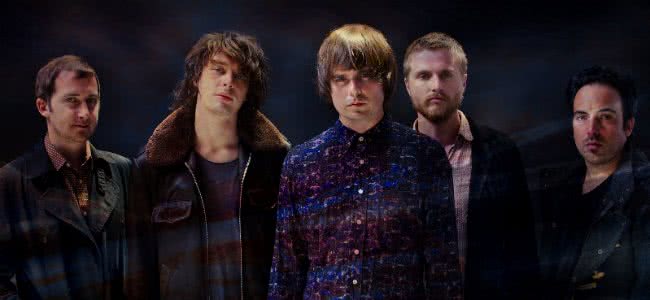Hunter S. Thompson mused that living in the sixties in California was like riding a beautiful wave. He wrote in Fear and Loathing that you could stand upon a high hill above Las Vegas, look westward and almost see the high water mark where that wave broke and rolled back. Forty years later and the resonance of that high and beautiful wave have spread further westward and the echoes of the Doors, the Monkees and the Beach Boys have resurfaced in Sydney five piece Deep Sea Arcade.
Already their infectious brand of psychedelic new wave indie surf art pop has weaselled its way into heads across Australia and long ago failed to be contained by the boundaries of our shores. In 2009, singles “Lonely In Your Arms” and “Don’t Be Sorry” made Deep Sea Arcade stand out as one of Australia’s hottest bands. In early 2011, they signed to Ivy League Records, home to Josh Pyke, Cloud Control and Mess Hall , and kicked off an amazing 2011.
2012 looks like it might be even better with the release of their debut album Outlands and kicked along by the triple j dominating hits, “Girls” and “Steam”. Already Deep Sea Arcade is building up an impressive array of fans and influential endorsers.
When I get onto Deep Sea Arcade’s songwriter and frontman Nic McKenzie, I’m afraid he may be calling from the band’s eponymous location. The phone reception might be clearer on the ocean floor rather than the New South Wales coastal region from where he chats, rocketing up the east coast with Children Collide and Sydney-sider pals Palms, McKenzie despite the lack of any blame, is charmingly apologetic.
Deep Sea Arcade, Nic explains, is the result of the creative sparks flying between McKenzie and bassist Nick Weaver.
“I’ve known him since primary school but we’ve been writing music together since we were fourteen, fifteen. But we use to collaborate artistically before that actually, but not musically.” While Nic mentions that this had in some forms manifested itself in art projects and the like, it was by no means limited to the art world.
“We use to have a thing called fun generating, which was like go to shopping centres and try to embarrass old ladies by being naughty… We just use to cause havoc over the place.” When he suggested that this havoc was being relived on the present tour I have but no option but to forewarn little old lady societies across the globe.
Alas, I fear I may have been too late. The current tour follows supporting roles to Noel Gallagher, Modest Mouse and Washington, UK tours and a spot at Barcelona’s Primavera Sound Festival. And next up: a Kaiser Chiefs support spot, a national tour of their own and then jet-setting off again to the UK.
While other Australian retro-infused rock acts seem obsessed with channelling the musical ghosts of Morrison, Scott and Lennon, Deep Sea Arcade have more adopted the heritage and aesthetics of bygone eras while asserting their own dark streak of individuality.
“We definitely are influenced by a lot of those sixties bands and in terms of sixties song structures and the way of kind of putting together songs in terms of having a song exist on its own.”
The amazing thing is that these songs, nursed into existence as home recorded demos still form the basis for the production of Deep Sea Arcade’s output. McKenzie and Weaver’s bedroom demos are still form the skeleton of the album, demos which are then brought to life by drummer Carlos Adura and guitarists Simon Relf and Tim Chamberlain. The band self-produced the album, receiving assistance with tracking from Simon Berkfinger (ex-Philadelphia Grand Jury) and Tim Whitten (Powderfinger, The Go-Betweens).
“We spent a lot of time working on our demos and putting a lot of production work into them at home. A lot of the time we’ll track a couple of guitar parts and take them back to the home studio and track more stuff.”
“All the songs started off as demos and a lot of the demos remain as demos on the record, just mixed.” A process completed in the UK by Dan Grech-Marguerat (The Vaccines, The Kooks) and by Doug Boehm (Girls, The Vines) in the USA.
The result is a kaleidoscopic pop record, with layer upon layer of dense sound almost enforcing bouts of synaesthesia. And this may be no accident. Outlands draws its title from the Jean-Luc Godard’s 1965 dystopian sci-fi film Alphaville, a reference to the secret agent hero’s land of origin. McKenzie makes particular reference to how this film and like-minded sixties dystopian cinema has influenced the bands creative leanings.
“I love dystopian sci-fi and those films kind of pre-anticipate a lot of things. But basically, in terms of their visual style they’re incredibly inspiring.” The link between Deep Sea Arcade’s musical inspiration and visual cues runs deep too. McKenzie, after studying film previously, took responsibility for directing the high-tail go-go dancing mod-suit beachside mop top bouffant acid drip geometric mist shrouded colour orgasms that are also known as Deep Sea Arcade’s music videos.
“There’s is always kind of a narrative that comes through most of the songs and they are suppose to create a kind of dialogue with the people that are listening to them.”
It seems dastardly unfair to spend so much time mentioning the influences behind Deep Sea Arcade, all artist are products of their influences, it’s also a reflection of the Australian rock scene over the past 10 years or so. But what seems admirable about Deep Sea Arcade is that they are determined to do things their way.
Outlands is out now on Ivy League Records. Catch Deep Sea Arcade on tour with Children Collide throughout March and April (check out the latest review here), and as Kaiser Chief support on their May tour.

































